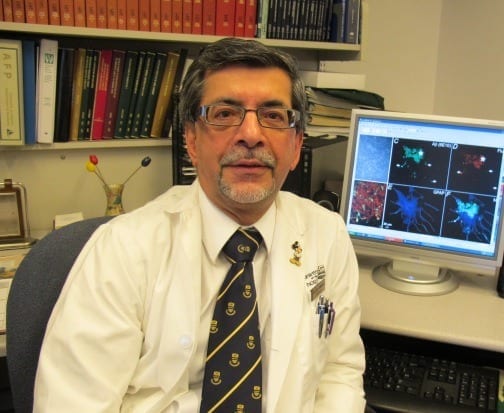Medical researchers at the University of Alberta have discovered a drug intended for diabetes appears to restore memory in Alzheimer’s brain cells.
Jack Jhamandas, a researcher with the Faculty of Medicine & Dentistry at the U of A, is the principal investigator with the team whose research results were recently published in the peer-reviewed publication The Journal of Neuroscience. He works in the Division of Neurology.
The team took brain tissue from animal models with Alzheimer’s disease and tested the tissue in the lab, looking specifically at the cells’ memory capacity. When brain cells are shocked by a barrage of electrical impulses, the cells “remember” the experience and this is a typical way to test or measure memory in the lab setting.
Amyloid protein, which is found in abnormally large amounts in the memory and cognition parts of the brains of Alzheimer’s patients, diminishes memory. A sister protein, known as amylin, which comes from the pancreas of diabetic patients, has the same impact on memory cells.
Jhamandas and his team demonstrated last year that a diabetes drug that never made it to market, known as AC253, could block the toxic effects of amyloid protein that lead to brain cell death.
In the lab, Jhamandas and his teammates, which included Ryoichi Kimura, a visiting scientist from Japan, tested the memory of normal brain cells and those with Alzheimer’s—both from animal models. When the drug AC253 was given to brain cells with Alzheimer’s and the shock memory tests were redone, memory was restored to levels similar to those in normal cells.
“This is very important because it tells us that drugs like this might be able to restore memory, even after Alzheimer’s disease may have set in,” says Jhamandas.
His team is continuing their research in this area and wants to see if the drug, when given before symptoms appear, can “stop the impairment of behaviour and cognition altogether in animals destined to develop Alzheimer’s,” says Jhamandas. Their continued research tests will take at least a year to complete.
Read more . . .
via University of Alberta Faculty of Medicine & Dentistry
The Latest Streaming News: Alzheimer updated minute-by-minute
Bookmark this page and come back often
Latest NEWS
Latest VIDEO








